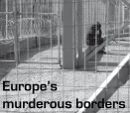
Four poles of suffering and denial of rights:
Calais region, Greek-Turkish border, Oujda region in eastern Morocco and Lampedusa. Report by Migreurop in France, English and Espanol.
Migreurop is an Euro-African network of 40 organisations from 13 countries working on issues of immigration policy, externalisation and their consequences within and beyond the EU's borders.
A report published by Migreurop in October 2009 paints a vivid picture of the effects of the EU's migration policies by focussing on three regions in which a number of common denominators are identified in spite of the significant difference between them (the Calais region and the north of France, the Greek-Turkish border and the Oujda region in eastern Morocco).
These are added to by a case study on events on the Italian island of Lampedusa, where practices have been adopted for the sake of expediency that confirm the suspicion that legal guarantees and human rights conceived as minimum standards for the treatment of all human beings are becoming a luxury that is not meant for migrants who have been criminalised and de-humanised as "illegals"."
The themes that run through all the sections from specific areas are those of controls and attempts to stop migrants, their detention in awful conditions that often entails abuses by guards, and a de-humanisation that goes so far as to result in deaths and in the use of legal and illegal dissuasive practices, among which the Dublin II regulation and illegal repatriations are identified as being particularly harmful. Instances of resistance against policies enacted by government by migrants themselves and local populations that express solidarity for them are also examined. A special emphasis is placed on how some French policies are officially justified as seeking to prevent "a draught" that would encourage others to migrate towards Europe, that the authors interpret as people being made to endure dreadful situations not for their own sake, but for the message to reach their home countries and particularly those who might be tempted to follow them in the future.
Surprising parallels are drawn, such as those between the "tranquillos" in northern Morocco and the so-called "jungles" in France, which are both make-shift shelters self-managed by those attempting to escape the attention of the police, immigration authorities, in short, to become invisible while they try to plan the next stage in their journey after hitting a dead end. In Morocco, they face the choice between trying to cross a heavily guarded stretch of the sea in which thousands have died en route to Spain, trying to climb the six-metre-high fencing erected around the Spanish north African enclave cities of Ceuta and Melilla, or to reach them by swimming around the border, again, risking death. In France, they have the Channel blocking their way into the UK, the Dublin II regulation stopping refugees among them from claiming asylum in case they are sent back to the countries they first entered the EU from (most often Greece, where the level of successful applications is well below 1%), resulting in a likelihood of them never being able to obtain asylum regardless of whether they fulfil the requirements for it.
Everywhere, the police are on their tracks, and capture involves the risk of detention, sometimes entailing violence as well as terrible living conditions, and expulsion, except for those who come from countries to where some European states will not expel them (unlike the UK, France does not usually repatriate Afghans), although this is not an issue if they are captured in Morocco or in Greece, where night-time returns to Turkey in perilous conditions across the river Evros are commonplace. The Italian practice of directly returning intercepted boats to Libya without identifying the people on board or their nationalities since May 2009 is a classic example of how the wish for expediency is trampling even the limited guarantees provided by increasingly harsh national immigration laws- expulsion without a judicial authority issuing a formal order; the presence of likely refugees disregarded; returns to presumed transit countries where they are likely to experience further abuses.
There are many excerpts of first-hand accounts from migrants' experiences, ranging from a complete lack of understanding of the situation in which they are forced, for instance an Afghan youth in Calais who wonders how it is possible that he is not allowed to stay, nor allowed to leave and is thus condemned to roaming aimlessly, feeling as if he were "in a cage", to harrowing descriptions of spiteful and mocking treatment at the hands of border guards that went so far as to lead people to perish, both on the Moroccan-Spanish border and the Greek-Turkish one.
The lasting impression caused by the report is that thousands of people are facing incredible ordeals as a result of policies, that awful living conditions from poorer countries are entering the EU as a result of exclusion and the creation of categories that are permanently forced to live in a condition of invisibility. On the other hand, to help them "regulate" immigration flows, the EU and its member states are funding a vast expansion of the internal security apparatus in bordering countries and of tough laws that are often implemented on the basis of skin colour.
This often means that visits by authorities from European countries and EU institutions for negotiations with third-country governments in this field result in indiscriminate round-ups in neighbourhoods in which large numbers of migrants live and in the spread of racism, both by security and police forces as well as by members of public, for example in north African countries against sub-Saharan migrants suspected of seeking to emigrate to Europe.
The report is available on the Migreurop website:
:: Les frontières assassines de l'Europe (French, original)
:: Europe's murderous borders (English)
:: Fronteras asesinas de Europa (Spanish)
:: Rapport Migreurop, Nov 2009, en (pdf)
Article by Bristol No Borders, :: bristolnoborders.wordpress.com, 25. Dec 2009



 grenzregime
grenzregime